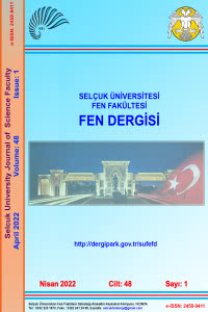BER OF ANNULAR BEAMS IN WEAK OCEANIC TURBULENCE
Halkasal Hüzmenin Zayıf Okyanussal Türbülansta Bit Hata Oranı
___
- Andrews, L. C., Phillips, R. L., Hopen, C. Y., 2001, Laser Beam Scintillation with Applications, SPIE, Bellingham, Washington.
- Andrews, L. C., Phillips, R. L., 2005, Laser Beam Propagation through Random Media, SPIE, Bellingham, Washington.
- Arpalı, S. A., Baykal, Y., 2009, ‚Bit Error Rates for Focused General-Type Beams‛, in Progress in Electromagnetics Research Symposium, Moscow, Russia, Vol. 5, No. 7, pp. 633-636.
- Arpalı, S. A., Eyyuboğlu, H. T., Baykal, Y., 2008, ‚Bit Error Rates for General Beams‛, Applied Optics, Vol. 47, No. 32, pp. 5971-5975.
- Ata, Y., Baykal, Y., 2014, ‚Scintillations Of Optical Plane And Spherical Waves In Underwater Turbulence‛, J. Opt. Soc. Am. A, Vol. 31, No. 7, pp. 1552-1556.
- Baykal, Y., 2015, ‚Intensity Fluctuations of Multimode Laser Beams in Underwater Medium‛, J. Opt. Soc. Am. A, Vol.32, No. 4, pp. 593-598.
- Baykal, Y., 2016, ‚Fourth-order Mutual Coherence Function in oceanic Turbulence‛, Applied Optics, Vol. 55, No. 11, pp. 2976-2979.
- Cheng, M., Guo, L., Li, J., Huang, Q., Cheng, Q., Zhang, D., 2016, ‚Propagation of An Optical Vortex Carried by a Partially Coherent Laguerre-Gaussian Beam in Turbulent Ocean‛, Applied Optics, Vol. 55, No. 17, pp. 4642-4648.
- Gerçekcioğlu, H., 2014, ‚Bit Error Focused Gaussian Beams in Weak Oceanic Turbulence‛, J. Opt. Soc. Am. A, Vol. 31, No. 9, 1963-1968.
- Gerçekcioglu, H., Baykal, Y., 2011, ‘‘Annular Beam Scintillations in Non-Kolmogorov Weak Turbulence‛, Applied Physics B - Lasers and Optics, Vol. 106, No. 4, pp. 933-937.
- Gerçekcioglu, H., Baykal, Y., 2013, ‚BER of Annular and Flat-topped Beams in Strong Turbulence‛, Optics Communication, Vol. 298-299, pp. 18-21.
- Gerçekcioglu, H., Baykal, Y., 2013, ‚BER of Annular and Flat-topped Beams in non-Kolmogorov Weak Turbulence‛, Optics Communications, Vol. 286, pp. 30-33.
- Gerçekcioglu, H., and Baykal, Y., Nakiboğlu, C., 2010, ‚Annular Beam Scintillations in Strong Turbulence‛, J. Opt. Soc. Am. A, Vol. 27, No. 8, pp. 1834-1839.
- Gerçekcioglu, H., Baykal, Y., Eyyuboğlu, H. T., 2010, ‚BER of Annular Beams in Strong Turbulence‛, Applications of Lasers for Sensing and Free Space Communications (LS&C) Topical Meeting, OSA / ASSP/LACSEA/LS&C, LSTuA4, 3 pp.
- Gökçe, M. C., Baykal, Y., 2016, ‚Scintillation Analysis of Multiple-input Single-output Underwater Optical Links‛, Applied Optics, Vol. 55, No. 22, pp. 6130-6136.
- Ishimaru, A., 1978, Wave Propagation and Scattering In Random Media, Vol.2, Academic Press, New York. Korotkova, O., Farwell, N., Shchepakina, E., 2012, ‚Light Scintillation in Oceanic Turbulence‛, Waves Random Complex, Vol. 22, No. 2, pp. 260-266.
- Kumar, P. V., Praneeth, S. S. K., and Narender, R. B., 2011, ‚Analysis of Optical Wireless Communication for Underwater Wireless Communication‛, International Journal of Scientific & Engineering Research, Vol. 2, No. 6, pp.194-202.
- Lu, W., Liu, L., Sun, J., 2006, ‚Influence of Temperature and Salinity Fluctuations on Propagation Behaviour of Partially Coherent Beams in Oceanic Turbulence‛, Journal of Optics A, Vol. 8, pp. 1052–1058.
- Namazi, N., Burris, R. J., Gilbreath, G. C., 2007, ‚Analytical Approach to The Calculation of Probability of Bit Error and Optimum Thresholds in Free-Space Optical Communication‛, Optical Engineering, Vol. 46, 025007-1-025007-7.
- Nikishov, V. V., and Nikishov, V. I., 2000, ‚Spectrum of Turbulent Fluctuation of Sea-Water Refractive Index‛, International Journal of Fluid Mechanics Research, Vol. 27, pp.82-98.
- Peng, X., Liu, L., Cai, Y., Baykal,Y., 2017, ‚Statistical Properties of a Radially Polarized Twisted Gaussian Schell-model Beam in an Underwater Turbulent Medium‛, J. Opt. Soc. Am. A, Vol. 34, No. 1, pp. 133-139.
- Sandalidis, H. G., Tsiftsis, T. A., Karagiannidis, G. K., Uysal, M., 2008, ‚BER Performance of FSO Links Over Strong Atmospheric Turbulence Channels with Pointing Errors‛, IEEE Communications Letters, Vol. 12, No. 1, pp. 44-46.
- Tatarski,V. I., 1961, Wave Propagation in a Turbulent Medium, McGraw-Hill, New York.
- Tyson, R. K., Canning, D. E., Tharp, J. S., 2005, ‚Measurement of The Bit-error Rate of an Adaptive Optics, Free-space Laser Communications System, part 1: Tip-tilt Configuration, Diagnostics, and Closed-Loop Results‛, Optical Engineering, Vol. 44, 096002-1-096002-6.
- Vetelino, F. S., Young,C., Andrews,L., 2007, ‚Fade Statistics and Aperture Averaging for Gaussian Beam Waves in Moderate-To Strong Turbulence‛, Applied Optics, Vol. 46, No. 18, pp. 3780–3789.
- Yi, X., Li, Z., and Liu, Z., 2015, ‚Underwater Optical Communication Performance for laser Beam Propagation Through weak Oceanic Turbulence‛, Applied Optics, Vol. 54, No. 6, pp. 1273- 1278.
- Yousefi, M., Golmohammady, S., Mashal, A., Kashani, F. D., 2015, ‚Analyzing the Propagation Behavior of Scintillation Index and Bit Error Rate of a partially Coherent Flat-Topped Laser Beam in Oceanic Turbulence,‛ J. Opt. Soc. Am. A, Vol. 32, No. 11, pp. 1982-1992.
- ISSN: 2147-9364
- Yayın Aralığı: 2
- Başlangıç: 2013
- Yayıncı: Selçuk Üniversitesi Mühendislik Fakültesi
EFFECT OF HEIGHT ON THE STATIC STABILITY OF HETEROGENEOUS EMBANKMENT DAMS
Mohsen YAZDANIAN, Hamid Reza AFSHOON, Sadegh GHASEMI, Vahid AFSHOON, Farhad FAHIM
SULPHURIC ACID LEACHING UNDER EFFECT OF SODIUM FLUORIDE
BER OF ANNULAR BEAMS IN WEAK OCEANIC TURBULENCE
HALİL AKINCI, SEDAT DOĞAN, CEM KILIÇOĞLU
YERALTI LİNYİT KÖMÜR MADENİNDE TERMAL KONFOR ŞARTLARININ İNCELENMESİ
THE DYNAMIC FACILITY LAYOUT PROBLEMS WITH CLOSENESS RATE: A FUZZY DECISION SUPPORT SYSTEM APPROACH
Pd/C CATALYSTS SYNTHESIZED BY MICROWAVE ASSISTED POLYOL METHOD FOR FORMIC ACID ELECTRO-OXIDATION
